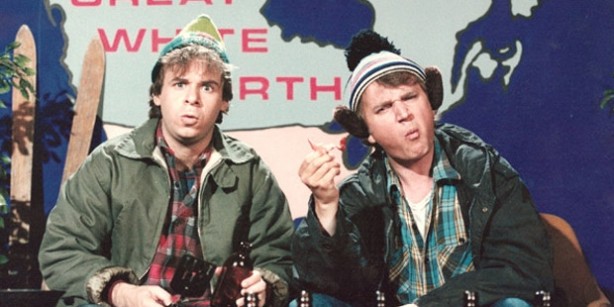 Music
Music
9 unlikely contenders for the Polaris Heritage Prize
by Aaron Brophy
August 26, 2015
From comedy classics to off-kilter gems, these Canadian albums deserve their due.
That pleasure twinge/involuntary shudder your music geek friend experienced last week probably has something to do with the reveal of the Polaris Music Prize’s new award for legacy albums, the Slaight Family Polaris Heritage Prize.
Much like the Polaris Prize itself, the Heritage Prize will go to Canadian albums of the “highest artistic quality without regards to sales or affiliations.” To do that, a cabal of 25 Polaris jurors will create a Short List of five heritage albums covering four separate time periods:
1. 1960s and 1970s
2. 1980s
3. 1990s
4. 2000s (2000-2005)
Then, between September 18 and October 5 the public — real, actual humans — will get to unleash their kraken and vote for which classic albums they think deserve the Heritage Prize. The winners will be announced October 9.
There’s a reasonable likelihood mega-classics like Neil Young’s Harvest, Joni Mitchell’s Blue, Sloan’s One Chord To Another, Maestro Fresh Wes’ Symphony In Effect, Leonard Cohen’s I’m Your Man, and Rush’s 2112 will score Heritage Prize nominations at some point. And rightfully so. They’re all worthy, wonderful albums that deserve the nod. But there’s so, so much more to Canadian music than just those canonized classics. The weird, the wild, the hilarious, and the bold all deserve their rightful acknowledgement.
With that in mind, here are nine unlikely contenders for the Slaight Family Polaris Heritage Prize:
Bob and Doug McKenzie – The Great White North (1981)
A Juno Award winner for comedy album of the year and Grammy Award nominee for best comedy album, The Great White North captures Canada’s unique hoser soul through Bob and Doug McKenzie’s beer-spun wisdom. “Take Off,” the brothers’ signature song with Rush’s Geddy Lee, is a beauty place to go.
G.I. Joe Killaz – S/T (2002)
Inspired by the Joe action figure/comic/cartoon series, the G.I. Joe Killaz were outwardly a novelty rap group supposedly staffed by COBRA villains Destro, The Baroness, and Cobra Commander. If you looked closely, though, they were far more. Anchored by techno producer Tomas Jirku’s solid beats, the narrative-driven musical adventures of the Killaz displayed a mind-boggling knowledge of their Joe universe source material.
Dayglo Abortions – Feed Us A Fetus (1986)
These crude first-wave hardcore punks were on the front line of the war against censorship that consumed the musical landscape in the 1980s. That was out of necessity, though. Album covers with caricatures of President Ronald Reagan dining on a dead baby and unambiguous songs like “Religious Bumfucks” made the band targets of conservative thinkers.
Various Artists – The Blue Jays Album (1992)
Say what you will about sports-themed jingles, but the Toronto Blue Jays baseball club’s fight song “OK Blue Jays” still rouses 40,000 people every night at Jays games some three decades after its release. This curated compilation of songs recorded by Jays associates and media figures features “OK Blue Jays” and is the second of a trilogy of albums that romanticized the team’s glorious World Series runs in 1992-93. The folks at TSN’s Bardown declared it “the best album in sports history.”
John Oswald – Plunderphonic (1989)
All these League Of Noble Peers/kopimi anti-copyright art people ain’t shit. Back in 1989 composer John Oswald gave the music industry brain-melt with his 25-track, no-clearance, musical sample-based Plunderphonic album, which reworked, amongst others, Beatles and Michael Jackson songs. Of course, The Man (the Canadian Recording Industry Association) sent in the lawyers and disappeared Plunderphonic, but it represented a pre-Internet harbinger of things to come.
Bruce McCulloch – Shame-Based Man (1995)
The Kids In The Hall were always way ahead of the culture-comedic curve and when McCulloch, the KITH member who knew a lot of Daves, released Shame-Based Man, it was like the revivification of the art of the musical comedy album. McCulloch also enlisted some legit players like Brian Connelly (Shadowy Men On A Shadowy Planet), Bob Wiseman (Blue Rodeo), and Don Kerr (Rheostatics) to help him.
Peaches – The Teaches Of Peaches (2000)
Canadians were so slow the first time around that Peaches had to exile herself to Berlin in order to get some respect for her empowered electroclash. Fifteen years later you can hear the influence of smut anthems like “Fuck The Pain Away,” “Lovertits,” and “AA XXX” everywhere from Lady Gaga to Ke$ha to Charli XCX.
Cheech & Chong – Cheech & Chong’s Wedding Album (1974)
Tommy Chong’s Canadian citizenship means the albums of the original pot comics meet the “50 per cent Canadian” criteria Polaris uses to qualify works. Cheech & Chong’s Wedding Album included the weirdo hit “Earache My Eye”, which was the basis for a bizarrely triumphant scene in the mind-altered duo’s 1978 movie Up In Smoke featuring Cheech Marin dancing around on stage in a pink ballet tutu.
Raggadeath – Why Ask Why (1995)
Nowadays rap-metal is generally considered a plague upon music. But for one brief window in the mid-’90s (after Ice T’s Body Count offended all the cops, but before Limp Bizkit ruined it all for the Nookie) one badass MC named Michie Mee created a safe place for reggae-rap industrial metal to exist.
Tags: Music, Cancon, News, Bob and Doug McKenzie, Cheech and Chong, Dayglo Abortions, GI Joe Killaz, John Oswald, Kids in the hall, peaches, Polaris 2015, Polaris Music Prize, Raggadeath, toronto blue jays





